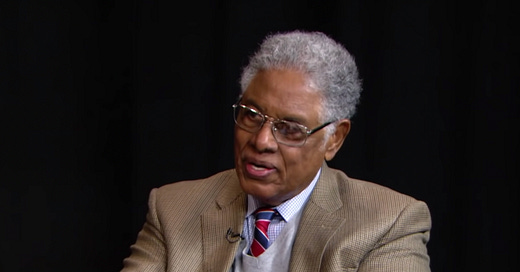By JOHN LEAKE
A few years ago my older brother told me a story he’d read (alas, he can no longer remember where) about an author who’d been part of the Resistance during the German occupation of France during World War II. Years later, he bumped into a comrade he’d not seen in the interim, and was surprised to see the man had become a Roman Catholic parish priest. They talked about his priestly occupation, which involved a great deal of listening to the men and women of the parish, and attending to their sorrows, frustrations, and sins.
“So what have you learned about people?” the writer asked the priest.
“That they are surprisingly unhappy, and that there are very few grown-ups in the world,” the priest replied.
I thought of this the other day as I was listening to an interview of the author and economist, Thomas Sowell, who spoke about what he described as two different visions—the “Constrained” and the “Unconstrained.”
The “Constrained” vision sees that nature (including human nature) and the material world impose inherent limitations on our condition. The problems of the world are not entirely a result of someone or some group being at fault. Many things—like the unequal distribution of health, vigor, and ability—are an intrinsic part of life. Through hard work and sacrifice, we can improve our lot within these constraints, but we can’t abolish these constraints altogether.
The “Unconstrained" vision presupposes that the only reason why everyone doesn’t have everything they want is because they are deprived by corrupt institutions and selfish rulers.
It seems to me that the “Constrained” vision is that held by reasonable grownups. Growing up is learning to recognize that we can’t always have everything and be everything we want, but must always act within certain constraints. We must accept that we are mortal—that all of the technology and injections in the world cannot fulfill our fantasies of being invulnerable, younger, richer, better looking, immortal, or a different sex.
The “Unconstrained” vision strikes me as that instinctively held by children. A child who throws a tantrum when his mother doesn’t give him what he wants is unconsciously in the grip of it.
As I have remarked in earlier columns, I suspect our reliance on unconstrained debt to maintain our standard of living (instead of increasing productivity) is a primary cause of our epidemic of childishness. On top of this is the enormous security and convenience of modern life, which most of us now take for granted. It almost never occurs to us—when we open the tap for clean water, flip a switch for lights or heat or AC, or flush the toilet—that a huge amount of work and ingenuity went into creating and building this infrastructure.
Since the USA was founded, its people have done an extraordinary job of overcoming so many of the limitations imposed upon us by nature and our mortality, thereby creating the most secure, prosperous, and free country in history. Now we appear to be victims of the success our forefathers bequeathed to us. We want MORE, we want it NOW, we want the STATE to provide it, and when we don’t get EVERYTHING we want, we BLAME others for it instead of examining and improving ourselves.






Thanks John. Diana West was way ahead of this; see "Death Of The Grown Up". Francis Schaeffer's "The God Who is There" identifies the dividing point in the 1930's ( Diana West's "American Betrayal" has related information regarding the first big lie). The basic problem is humans think that they are their own - large swaths of society do not believe in God and have adopted moral relativism - what you see today is the result. NONE of the lunacy and madness you see today is by accident; it is the result of decades of planning and execution, directed at destroying the American way of life. We now live in a fascist country - the corporations control the government. Peace.
Many people, too many, don’t know who Thomas Sowell is. As brilliant a man as there is.